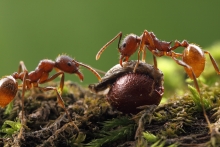You are here
New Study: Climate Warming Destabilizes Forest Ant Communities

A study published today in Science Advances, co-authored by HF Senior Ecologist Aaron Ellison with scientists from six other institutions, shows that climate warming disrupts forest ant communities responsible for important soil turnover and seed dispersal processes.
In a five-year experiment conducted at both the Harvard Forest and Duke Forest in North Carolina, high-walled chambers in the forest were consistently warmed an additional 1.5 to 5.5 degrees Celsius throughout the year. Gaps in the bottom of the chambers allowed crawling insects to migrate in and out. In unheated chambers, colonies of different ant species regularly came and went. But warming increased the occupancy of nests by heat-loving species, which stayed in nests for longer periods of time, diminishing turnover and likely altering species dynamics.
The study was funded by the US Department of Energy Program for Ecosystem Research and the National Science Foundation.
- Read the full scientific paper in Science Advances: Climatic Warming Destabilizes Ant Communities
- Read the press release.
- Learn more about the Warm Ants experiment at Harvard Forest.
(Photo of Aphaenogaster rudis ants with bloodroot seed by Alex Wild)

